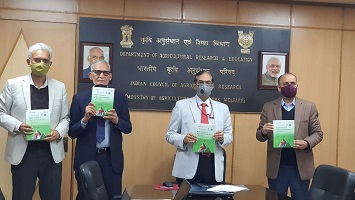Large Scale Diagnostic Surveys to guide research and extension priorities - DG, ICAR
CSISA-KVK collaborative Project Review on Monitoring, Evaluation and Learning through Large Scale Diagnostic Survey organized
7th January, 2021
Dr. Trilochan Mohapatra, Secretary (DARE) & DG (ICAR) chaired the CSISA-KVK collaborative Project Review on Monitoring, Evaluation and Learning through the large scale Diagnostic Survey today. Dr. Mohapatra applauded the observations made through the Large Scale Diagnostic Survey (LDS) of rice and wheat crops. He desired that five major recommendations which are revealed from the survey viz. impact of early sowing of wheat and rice, application of nutrients, irrigation at critical stages etc., may be brought out from Wheat and Rice Surveys. The Director General stressed on taking-up the recommendations with the Department of Agriculture, Cooperation & Farmers’ Welfare, Ministry of Agriculture & Farmers’ Welfare, Government of India for the different regions and states.

Dr. Mohapatra emphasized on taking-up such surveys in horticulture, dairy and fisheries sector too. He stressed on harnessing the KVK’s strength. The Director General also released the Publication “New Frontiers in Agricultural Extension” - Volume - II based on LDS for rice crop during the occasion.
Dr. Ashok Kumar Singh, Deputy Director General (Agricultural Extension), ICAR outlined the adoption Patterns of different varieties in rice. He underlined that the older varieties, such as, MTU 7029 (Swarna) released in 1982 and BPT 5204 (Samba Mahsuri) released in 1986 continue to dominate the Eastern India region. The Paddy yields in Bihar and Eastern Uttar Pradesh were just half to that of Punjab and Haryana within the same maturity class. Dr. Singh highlighted the increase of Paddy yields in Punjab with very low application of P and K. He stated that the farmers in Eastern Uttar Pradesh and Bihar with much better natural resources and much better-balanced use of NPK lag farmers of Punjab and Haryana in paddy yield. The DDG urged for promoting the timely sown Wheat varieties (TSWVs) in the EIGP as it helps in beating the terminal heat and improves yield in EIGP.
Dr. R.K. Malik, Consultant, CIMMYT underlined the adoption patterns of different agronomic practices in rice. On carrying out the Landscape Survey in the states of Bihar, Uttar Pradesh, Odisha, West Bengal, Chattisgarh, Andhra Pradesh, Haryana and Punjab across 8 ICAR-ATARIs and 102 Districts having 110 KVKs, Dr. Malik observed the yield differences within and between the states. He stressed that the diversification is not happening from rice to other crops, but it can happen within rice. He emphasized that the accurate weather forecasting can help planning the transplanting time of rice. The automated weather forecasting service can be further improved by including agronomic management data and studying interactions for developing messages.
Dr. Peter Craufurd, Project Leader, CSISA reported the Landscape Diagnostic Survey and its future implications - leading to Monitoring Evaluation & Learning in Agricultural Extension System and R4D. He emphasized that the LDS is a near real-time Monitoring, Evaluation & Learning (MEL) System which will facilitate the ICAR, ICAR-ATARIs / SAUs & KVKs to make evidence-based decisions on priorities & resource allocation.
Earlier, in his welcome address, Dr. Randhir Singh, ADG (Agricultural Extension), ICAR outlined about the CSISA-KVK Webinar.
Dr. Sudhanshu Singh, Director, International Rice Research Institute, South Asia Regional Centre, Varanasi, Uttar Pradesh & Senior Scientist (Agronomy), South Asia proposed the vote of thanks.
(Source: Division of Agricultural Extension, Indian Council of Agricultural Research, New Delhi)








Like on Facebook
Subscribe on Youtube
Follow on X X
Like on instagram